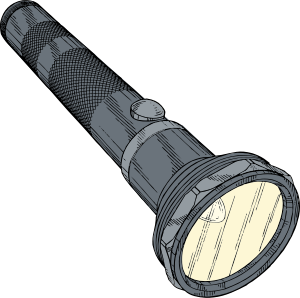Fishing at Night Chapter 3
The estuaryestuary at MatakanaMatakana was a very good place for flounder fishingfishing because the shore was partlypartly muddymuddy and partly sandy,sandy, and the water was shallow and warm – just the kind of place flounders like best, especiallyespecially at night.
As soon as tea was over, Tim said, “Come on, it isit’s dark enough now.”
Ricki, who was sittingsitting on a chair on the verandah,verandah, called,called, “I can see people goinggoing to the bonfiresbonfires already.already. HurryHurry up Mia! Hurry up Mum and Dad!” And awayaway the childrenchildren ran.
 Mr and Mrs Gale washedwashed the dishesdishes and then followeded the children.children. When all the camperscampers had gatheredgathered at the biggestbiggest bonfire, Jan’s father set it alight.alight. They all movedmoved to the secondsecond and lit that, and then the third until all the fires were burningburning brightly. Everyonely. Everyone took a spear in one hand and a torch in the other and beganbegan walkingwalking very quietlyquietly through the water, lookinglooking for flounders. Some people had electricelectric torchestorches but some usedused burningburning sticks from the fires. A few had lanterns.lanterns. Mia had Mr Gale's electric torch because she was the oldestoldest and Tim and Ricki used flareflaring sticks.
Mr and Mrs Gale washedwashed the dishesdishes and then followeded the children.children. When all the camperscampers had gatheredgathered at the biggestbiggest bonfire, Jan’s father set it alight.alight. They all movedmoved to the secondsecond and lit that, and then the third until all the fires were burningburning brightly. Everyonely. Everyone took a spear in one hand and a torch in the other and beganbegan walkingwalking very quietlyquietly through the water, lookinglooking for flounders. Some people had electricelectric torchestorches but some usedused burningburning sticks from the fires. A few had lanterns.lanterns. Mia had Mr Gale's electric torch because she was the oldestoldest and Tim and Ricki used flareflaring sticks.
|
Comprehension Summarise what has happened so far in this narrative. Clarify these words: estuary, shore, shallow, especially, verandah, bonfires, electric, gathered, lanterns, flaring. Retell what has happened in this chapter. Make inferences and give opinions about:
What prediction can you make about what might happen next? What question could you ask about this chapter? Visualise these uses of descriptive language: shore was partly muddy and partly sandy; water was shallow and warm; campers gathered at the biggest bonfire; all the fires were burning brightly, everyone took a spear in one hand and a torch in the other and began walking quietly through the water; flaring sticks. Make a connection with this chapter. |
Word Study Verb endings: What happens when we add s, ed or ing to: sit, go, run, do, move, light, set, take, begin, use, flare. Other affixes: What happens when we add other prefixes and suffixes like e, ly, y, s, est to these words: special, part, bright, quiet, mud, sand, dish, big, old. What two words make up these compound words: already, bonfire, alight. What two words are contracted here: it's. What does the apostrophe mean in: Mr Gale's torch. |